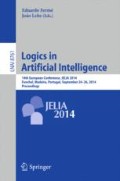Abstract
Among the various proposals for defeasible reasoning for description logics, Rational Closure, a procedure originally defined for propositional logic, turns out to have a number of desirable properties. Not only it is computationally feasible, but it can also be implemented using existing classical reasoners. One of its drawbacks is that it can be seen as too weak from the inferential point of view. To overcome this limitation we introduce in this paper two extensions of Rational Closure: Basic Relevant Closure and Minimal Relevant Closure. As the names suggest, both rely on defining a version of relevance. Our formalisation of relevance in this context is based on the notion of a justification (a minimal subset of sentences implying a given sentence). This is, to our knowledge, the first proposal for defining defeasibility in terms of justifications—a notion that is well-established in the area of ontology debugging. Both Basic and Minimal Relevant Closure increase the inferential power of Rational Closure, giving back intuitive conclusions that cannot be obtained from Rational Closure. We analyse the properties and present algorithms for both Basic and Minimal Relevant Closure, and provide experimental results for both Basic Relevant Closure and Minimal Relevant Closure, comparing it with Rational Closure.
Access this chapter
Tax calculation will be finalised at checkout
Purchases are for personal use only
Preview
Unable to display preview. Download preview PDF.
References
Baader, F., Calvanese, D., McGuinness, D., Nardi, D., Patel-Schneider, P.: The Description Logic Handbook: Theory, Implementation and Applications, 2nd edn. Cambridge University Press (2007)
Baader, F., Hollunder, B.: How to prefer more specific defaults in terminological default logic. In: Proceedings of IJCAI, pp. 669–674. Morgan Kaufmann Publishers (1993)
Baader, F., Hollunder, B.: Embedding defaults into terminological knowledge representation formalisms. Journal of Automated Reasoning, 306–317 (1995)
Bonatti, P., Faella, M., Sauro, L.: Defeasible inclusions in low-complexity DLs. JAIR 42, 719–764 (2011)
Bonatti, P., Faella, M., Sauro, L.: On the complexity of EL with defeasible inclusions. In: Proceedings of IJCAI, pp. 762–767 (2011)
Bonatti, P., Lutz, C., Wolter, F.: The complexity of circumscription in description logic. JAIR 35, 717–773 (2009)
Britz, K., Casini, G., Meyer, T., Moodley, K., Varzinczak, I.: Ordered interpretations and entailment for defeasible description logics. Technical report, CAIR, CSIR Meraka and UKZN, South Africa (2013)
Britz, K., Heidema, J., Meyer, T.: Semantic preferential subsumption. In: Lang, J., Brewka, G. (eds.) Proceedings of KR, pp. 476–484. AAAI Press/MIT Press (2008)
Britz, K., Meyer, T., Varzinczak, I.: Semantic foundation for preferential description logics. In: Wang, D., Reynolds, M. (eds.) AI 2011. LNCS (LNAI), vol. 7106, pp. 491–500. Springer, Heidelberg (2011)
Casini, G., Meyer, T., Moodley, K., Varzinczak, I.: Nonmonotonic reasoning in description logics: Rational closure for the Abox. In: Proceedings of DL, pp. 600–615 (2013)
Casini, G., Meyer, T., Moodley, K., Varzinczak, I.: Towards practical defeasible reasoning for description logics. In: Proceedings of DL, pp. 587–599 (2013)
Casini, G., Straccia, U.: Rational closure for defeasible description logics. In: Janhunen, T., Niemelä, I. (eds.) JELIA 2010. LNCS (LNAI), vol. 6341, pp. 77–90. Springer, Heidelberg (2010)
Casini, G., Straccia, U.: Lexicographic closure for defeasible description logics. In: Proc. of Australasian Ontology Workshop (2012)
Cuenca Grau, B., Horrocks, I., Kazakov, Y., Sattler, U.: Modular reuse of ontologies: Theory and practice. JAIR 31, 273–318 (2008)
Donini, F.M., Nardi, D., Rosati, R.: Description logics of minimal knowledge and negation as failure. TOCL 3(2), 177–225 (2002)
Giordano, L., Gliozzi, V., Olivetti, N.: Minimal model semantics and rational closure in description logics. In: Proceedings of DL (2013)
Giordano, L., Gliozzi, V., Olivetti, N., Pozzato, G.L.: Rational Closure in Description Logics of Typicality. In: IAF (2013)
Giordano, L., Olivetti, N., Gliozzi, V., Pozzato, G.L.: \(\mathcal{ALC}+{T}\): A preferential extension of description logics. Fundamenta Informaticae 96(3), 341–372 (2009)
Giordano, L., Gliozzi, V., Olivetti, N., Pozzato, G.L.: A minimal model semantics for nonmonotonic reasoning. In: del Cerro, L.F., Herzig, A., Mengin, J. (eds.) JELIA 2012. LNCS, vol. 7519, pp. 228–241. Springer, Heidelberg (2012)
Hansson, S.O.: A Textbook of Belief Dynamics: Theory Change and Database Updating. Kluwer Academic Publishers (1999)
Horridge, M.: Justification based explanation in ontologies. The University of Manchester (2011)
Ke, P., Sattler, U.: Next Steps for Description Logics of Minimal Knowledge and Negation as Failure. In: Proceedings of DL (2008)
Kraus, S., Lehmann, D., Magidor, M.: Nonmonotonic reasoning, preferential models and cumulative logics. Artificial Intelligence 44, 167–207 (1990)
Lehmann, D.: Another perspective on default reasoning. Annals of Mathematics and Artificial Intelligence 15(1), 61–82 (1995)
Lehmann, D., Magidor, M.: What does a conditional knowledge base entail? Artificial Intelligence 55, 1–60 (1992)
Lukasiewicz, T.: Expressive probabilistic description logics. Artificial Intelligence 172(6-7), 852–883 (2008)
Padgham, L., Zhang, T.: A terminological logic with defaults: A definition and an application. In: Proceedings of IJCAI, pp. 662–668. Morgan Kaufmann (1994)
Quantz, J.: A preference semantics for defaults in terminological logics. In: Proceedings of KR, pp. 294–305 (1992)
Reiter, R.: A logic for default reasoning. Artificial Intelligence 13(1-2), 81–132 (1980)
Sengupta, K., Krisnadhi, A.A., Hitzler, P.: Local closed world semantics: Grounded circumscription for OWL. In: Aroyo, L., Welty, C., Alani, H., Taylor, J., Bernstein, A., Kagal, L., Noy, N., Blomqvist, E. (eds.) ISWC 2011, Part I. LNCS, vol. 7031, pp. 617–632. Springer, Heidelberg (2011)
Author information
Authors and Affiliations
Editor information
Editors and Affiliations
Rights and permissions
Copyright information
© 2014 Springer International Publishing Switzerland
About this paper
Cite this paper
Casini, G., Meyer, T., Moodley, K., Nortjé, R. (2014). Relevant Closure: A New Form of Defeasible Reasoning for Description Logics. In: Fermé, E., Leite, J. (eds) Logics in Artificial Intelligence. JELIA 2014. Lecture Notes in Computer Science(), vol 8761. Springer, Cham. https://doi.org/10.1007/978-3-319-11558-0_7
Download citation
DOI: https://doi.org/10.1007/978-3-319-11558-0_7
Publisher Name: Springer, Cham
Print ISBN: 978-3-319-11557-3
Online ISBN: 978-3-319-11558-0
eBook Packages: Computer ScienceComputer Science (R0)

